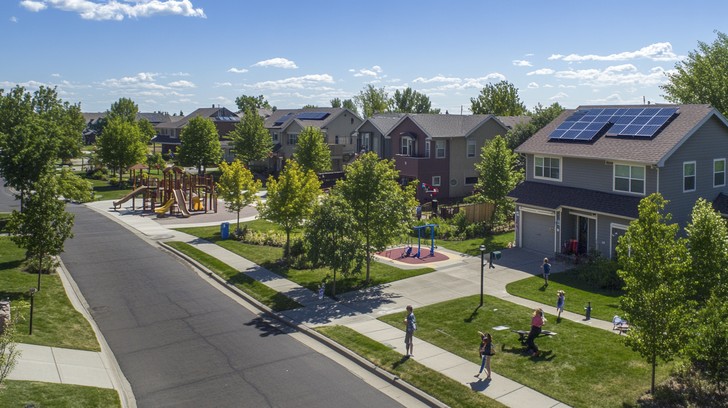
Urban Sustainability Definition: What It Means Today
The urban sustainability definition is a critical concept in today’s world, especially as more people move into cities. This term encompasses a range of strategies and practices aimed at creating cities that are environmentally, economically, and socially sustainable. As urban areas expand, understanding and implementing sustainable practices becomes vital. This article will delve into the various aspects of urban sustainability and how they can shape a better future for everyone.

Understanding Urban Sustainability
Urban sustainability involves creating urban environments that are not only livable but also resilient and regenerative. This means developing cities that can sustain themselves without depleting resources or causing harm to the environment. The goal is to achieve a balance where urban growth does not compromise the well-being of future generations. This concept is particularly relevant as urban populations continue to grow.
According to the UNECE, sustainable urban development involves integrating economic, social, and environmental objectives to ensure that cities are inclusive, safe, resilient, and sustainable.
The Importance of Urban Sustainability
The significance of urban sustainability cannot be overstated. With urban areas accounting for a significant portion of global resource consumption and greenhouse gas emissions, sustainable practices are essential. Implementing these practices helps reduce environmental impact, improve quality of life, and promote economic stability.
Moreover, urban sustainability is crucial for addressing challenges such as climate change, resource scarcity, and social inequality. By adopting sustainable practices, cities can become more resilient to these challenges and provide a better quality of life for their inhabitants.
Key Elements of Urban Sustainability
Urban sustainability encompasses various elements, each contributing to the overall sustainability of a city. These elements include:
- Green Architecture: Incorporating sustainable building materials and energy-efficient designs. Learn more about recycled materials in construction.
- Efficient Transportation: Promoting public transportation, cycling, and walking to reduce carbon emissions.
- Renewable Energy: Utilizing solar, wind, and other renewable energy sources to power urban areas.
- Waste Management: Implementing recycling and composting programs to reduce waste.
Challenges in Achieving Urban Sustainability
While the benefits of urban sustainability are clear, achieving it is fraught with challenges. These include:
- Resource Constraints: Limited resources can hinder the implementation of sustainable practices.
- Economic Barriers: High costs associated with sustainable technologies can be prohibitive.
- Social Resistance: Public resistance to change can impede efforts to implement sustainable practices.
Strategies for Promoting Urban Sustainability
To overcome these challenges and promote urban sustainability, cities can adopt a range of strategies:
Public Policy and Planning
Effective policies and planning are crucial for promoting urban sustainability. Governments can implement regulations and incentives to encourage sustainable practices. These might include building codes requiring energy-efficient designs or tax incentives for renewable energy use.
Community Engagement
Engaging communities is essential for promoting urban sustainability. By involving residents in decision-making processes, cities can ensure that sustainable practices are tailored to the needs and preferences of their inhabitants.
Technological Innovation
Innovation is a key driver of urban sustainability. Technologies such as smart grids, electric vehicles, and green buildings can significantly reduce the environmental impact of urban areas.
Learn about the role of natural ventilation in building design for sustainability.
Case Studies: Successful Urban Sustainability Initiatives
Several cities around the world have successfully implemented urban sustainability initiatives. These case studies provide valuable insights into what works and what doesn’t.
Copenhagen, Denmark
Copenhagen is a leading example of urban sustainability. The city has implemented extensive cycling infrastructure, renewable energy projects, and green building initiatives. As a result, it is on track to become carbon neutral by 2025.
Vancouver, Canada
Vancouver is another city that has made significant strides in urban sustainability. The city has focused on reducing greenhouse gas emissions, promoting public transportation, and enhancing green spaces.
Discover more about the sharing economy in housing as a sustainable practice.
The Future of Urban Sustainability
The future of urban sustainability is promising. As more cities recognize the benefits of sustainable practices, the trend is likely to continue. Emerging technologies and innovative solutions will play a crucial role in shaping the future of urban sustainability.
By adopting sustainable practices, cities can not only reduce their environmental impact but also enhance the quality of life for their inhabitants. This makes urban sustainability a vital component of a sustainable future.
Conclusion
In conclusion, the urban sustainability definition encompasses a range of strategies and practices aimed at creating sustainable urban environments. While challenges exist, the benefits of urban sustainability are clear. By adopting sustainable practices, cities can become more livable, resilient, and economically stable.

FAQ
What is urban sustainability?
Urban sustainability refers to the development of urban environments that are environmentally, economically, and socially sustainable. It involves practices that reduce environmental impact, promote economic stability, and improve quality of life.
Why is urban sustainability important?
Urban sustainability is crucial for reducing the environmental impact of cities, addressing challenges such as climate change and resource scarcity, and improving quality of life for urban inhabitants.
How can cities achieve urban sustainability?
Cities can achieve urban sustainability by implementing effective policies, engaging communities, and leveraging technological innovations. These strategies can help overcome challenges and promote sustainable practices.
This article contains affiliate links. We may earn a commission at no extra cost to you.